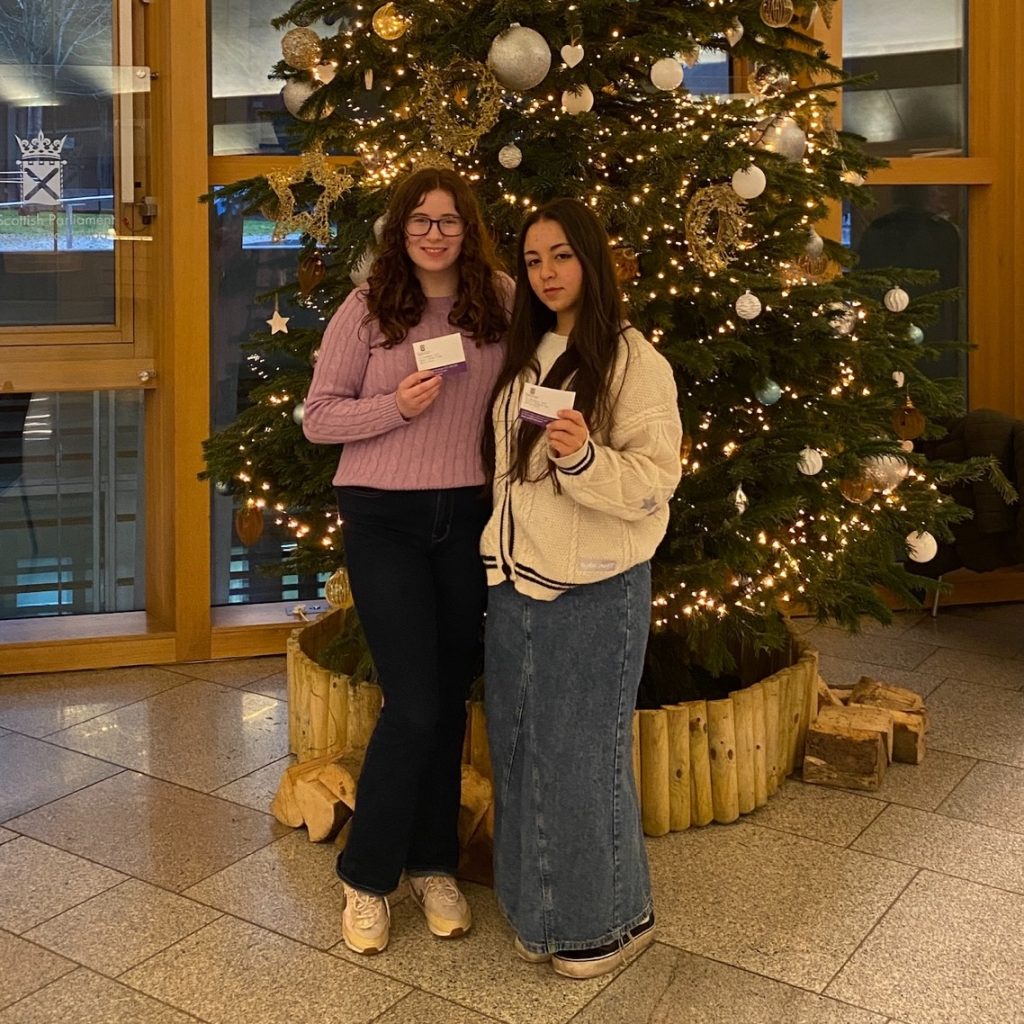On November 20th, 2023, as part of celebrations for World Children’s Day, MCP Arden participated in the first roundtable event as part of the International and Canadian Child Rights Partnership (ICCRP). Arden was randomly selected from a group of children and young people who have been meeting monthly as part of the Intergenerational Advisory Committee (IAC) and presented alongside peers from South Africa, Canada and Bolivia to an online international audience. See her brilliant speech below!

Arden and fellow Member of Children’s Parliament, Omima, with the Scottish Parliament Christmas tree
on the day the UNCRC Incorporation Bill vote was passed.
To start off, I think it’s important to first address why adults should listen to children. Children make up a huge part of society and are influenced and affected in some way by every law and decision made by governments and organisations. Despite this, children aren’t consulted on decisions that affect them. Children can offer valuable insight, because children know best what it’s like to be a child in this day and age, as well as what children need now. In my opinion, it’s crazy that adults don’t get children’s input when making decisions that affect them, because you wouldn’t ask a child to decide what adults need, because they don’t know what it’s like to be an adult.
Children also offer creative solutions to problems, because nothing is bigger than a child’s imagination. Young children are less focused on what others think. Adults tend to worry more about what co-workers and bosses think of them as well as looking stupid, or silly. It’s so important for decision-makers to give children the chance to speak and be listened to, because that ensures that all adults’ time spent on making laws to protect children isn’t wasted and is effective at keeping children healthy, happy and safe.
So, now to get on to how adults can actually listen better to children. First things first, start treating children as children when consulting them on ideas, children aren’t mini adults. To effectively communicate with children, it’s important to be fun, and creative so children don’t feel intimidated. This means not having big formal meetings, but communicating in a way that children are engaged. This can be done in so many different ways, like learning through play or arts and crafts. It’s intimidating for even an adult to sit in a formal business meeting, so imagine how scary it must be for children!
Another way to engage with children is to go to their spaces. Remember adults can come into children’s space too, this can help children feel more comfortable and secure. For example, you can engage with children in places like schools and youth clubs. Also, it’s important to not rush through everything and be patient. Being patient means that children feel comfortable and lets them fully engage. It’s also vital that you are clear about what you’re asking children and let them know in advance what you are going to be discussing so they can prepare, know what to expect, and be comfortable. For example, the IAC sends out an agenda before each meeting.
When working with children and young people it’s important to phrase what you’re saying in a clear child-friendly way, that way everyone can understand each other and communicate effectively. Talk to us like capable individuals because that’s what we are. Also, please don’t interrupt or assume anything about our opinions and experiences because everyone is different. What is true for one child might not be true for another.
All children can contribute, they just need the right support. For example, this could be having a supportive and familiar adult around. Another mistake that lots of adults and decision makers often make is only talking to young people because it’s easier to work with them in a more adult fashion that is more familiar to adults. Younger children are just bursting with creative ideas and solutions. They are just waiting to be given an opportunity where they can be listened to. It’s just about giving them the space, time and support.
Listening to children and consulting them is amazing work and a huge step in the right direction, but children often feel unheard and unseen when they’re not updated on what happens after talking. Something as simple as a two-minute email or video is the difference between children feeling heard and ignored. Feedback should also always be child friendly so they can understand what impact they have had. Children and young people understand that you can’t always accommodate their requests and ideas but please explain the reason and if possible, how you can compromise.
A recent experience which incorporates lots of these points is the children’s right progress meeting for the UK at the UN. During this process, children and young people engaged directly with members of the UN. All the children and young people got a chance to speak about their experiences and ideas in a safe environment. The committee members were respectful and attentive when listening to every child and young person, this makes everyone feel valued. They also used child friendly language so everyone could understand and be included. It was made clear that every child was listened to in the report. The report included feedback for the UK government that reflected everything brought up in the meeting with children. As children and young people, it is amazing to see our ideas and feedback are valued by an organisation as big as the UN, and important enough to be fed back to our government. It makes us feel like we have really had an impact, and that our hard work preparing hasn’t gone to waste.
It is our right to be listened to. So please respect it.
Well done Arden! We at Children’s Parliament are all so proud of you and we look forward to seeing what you do next.